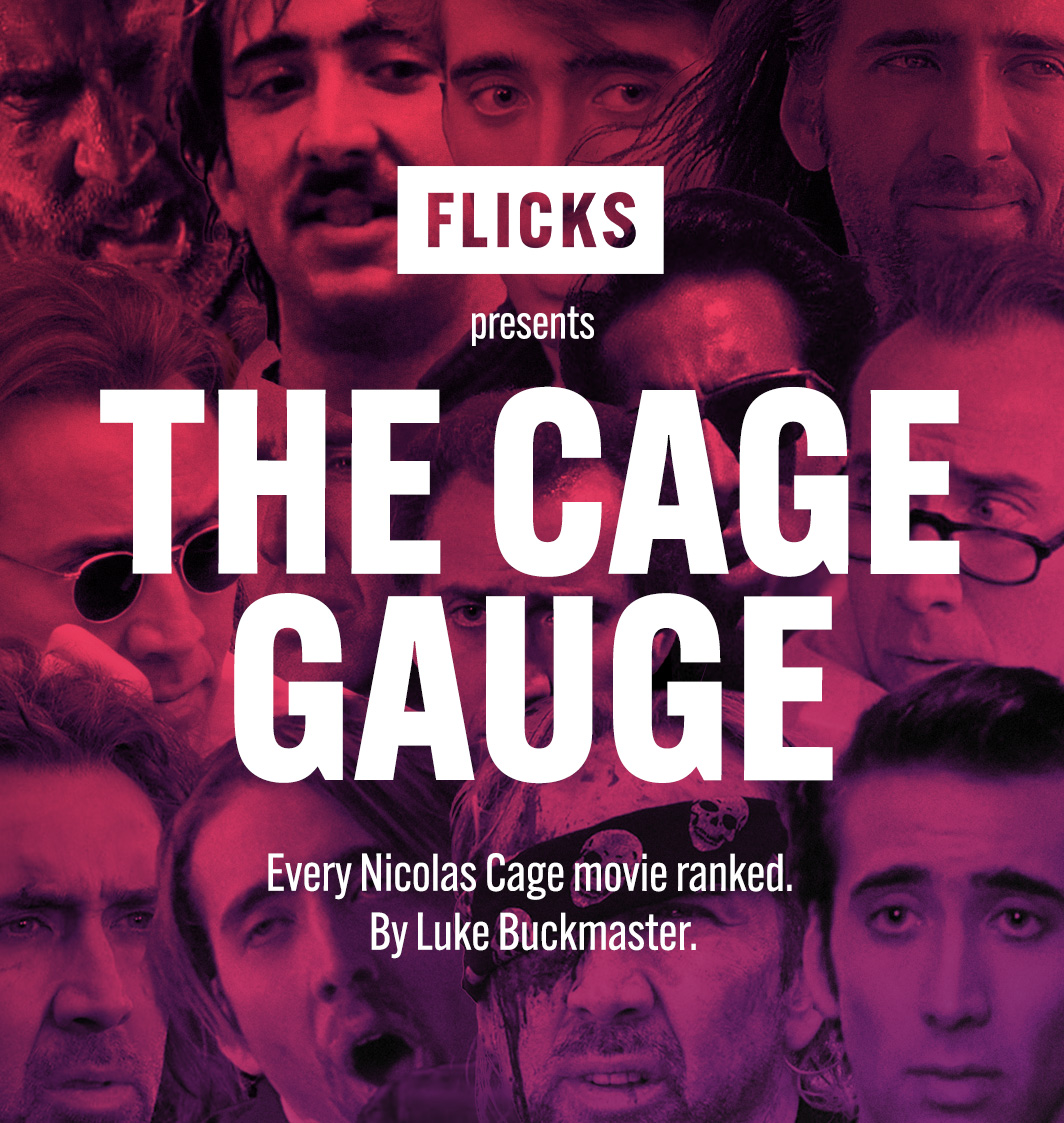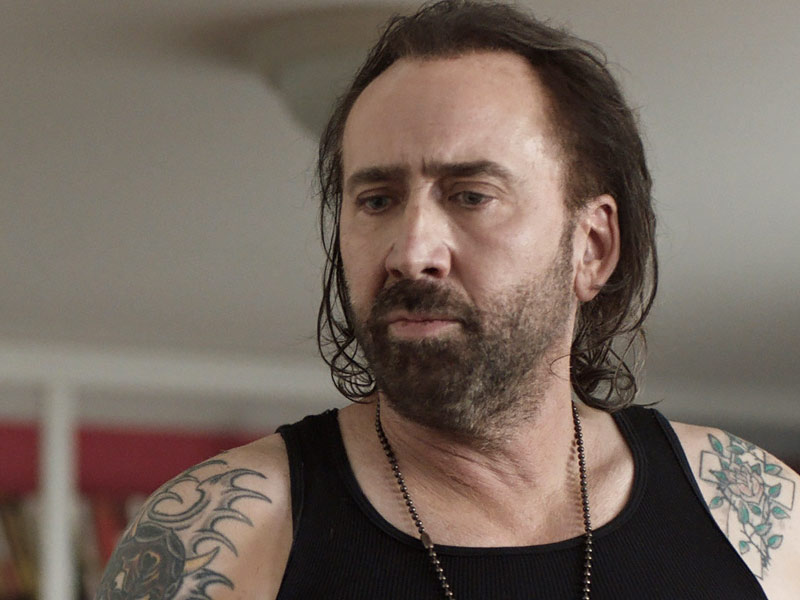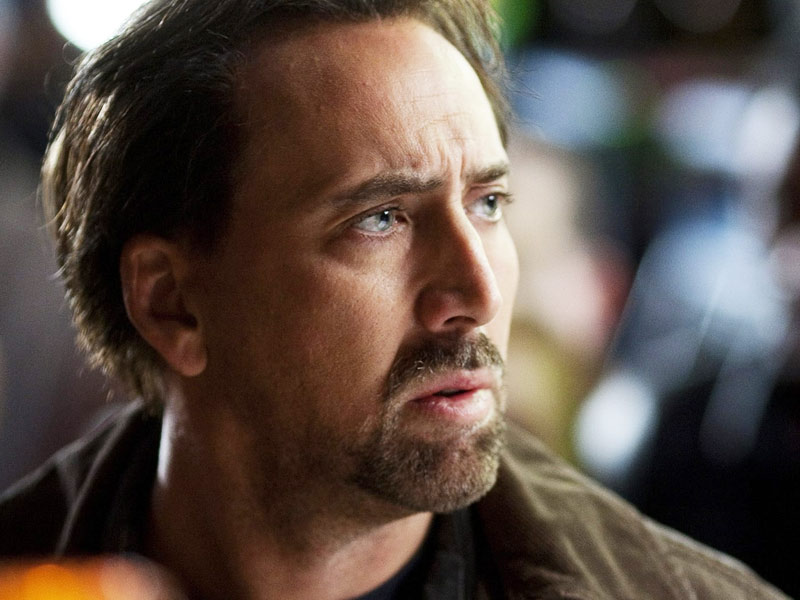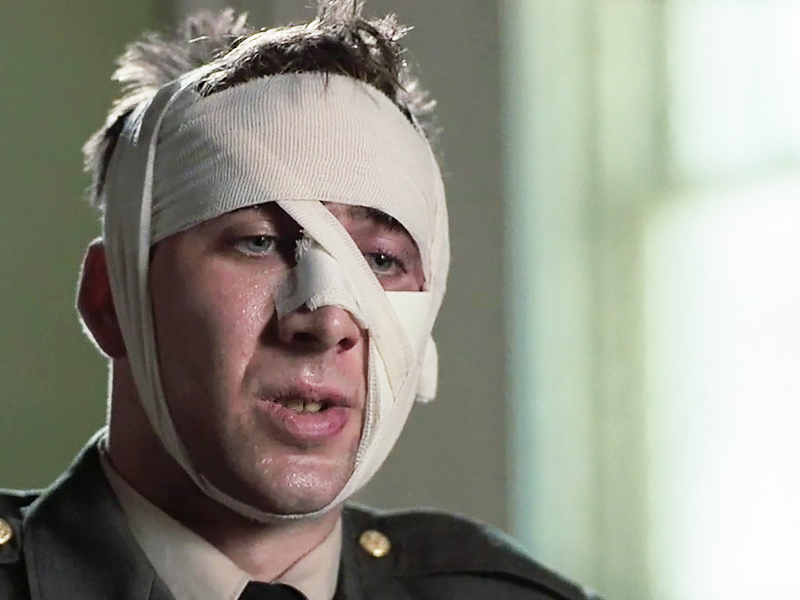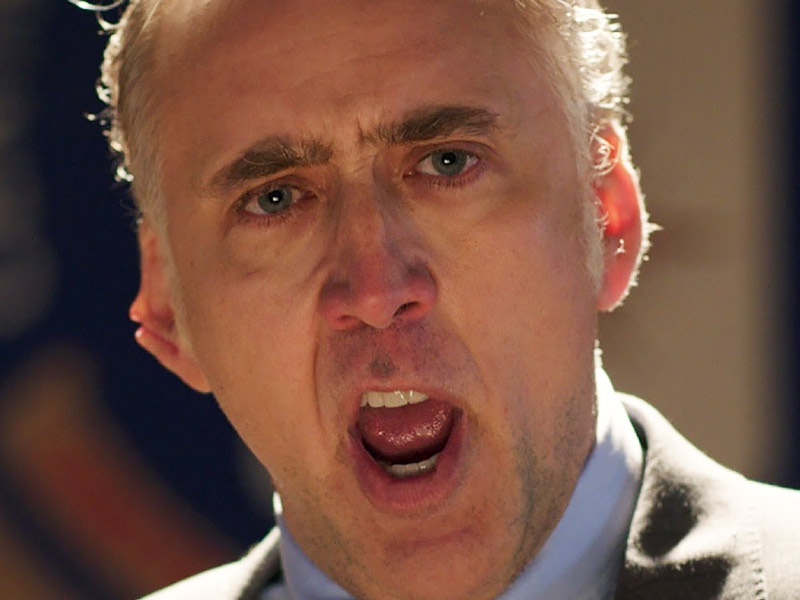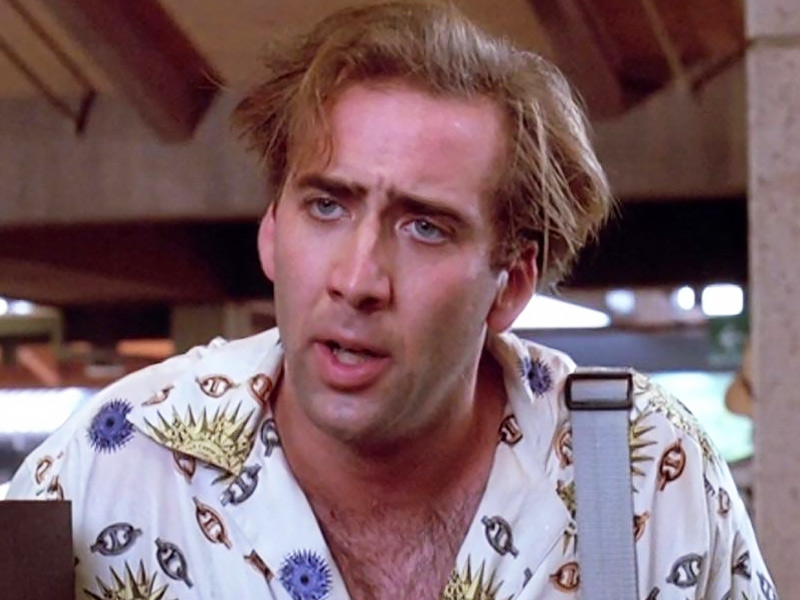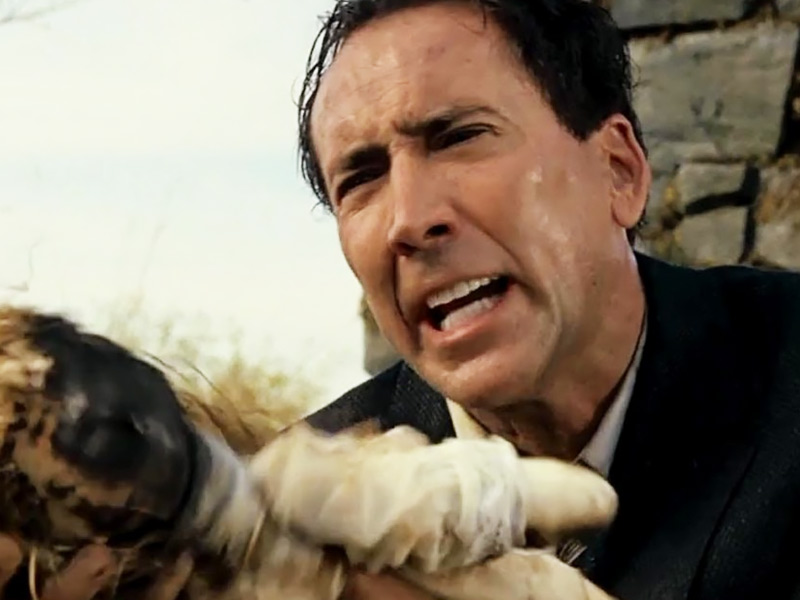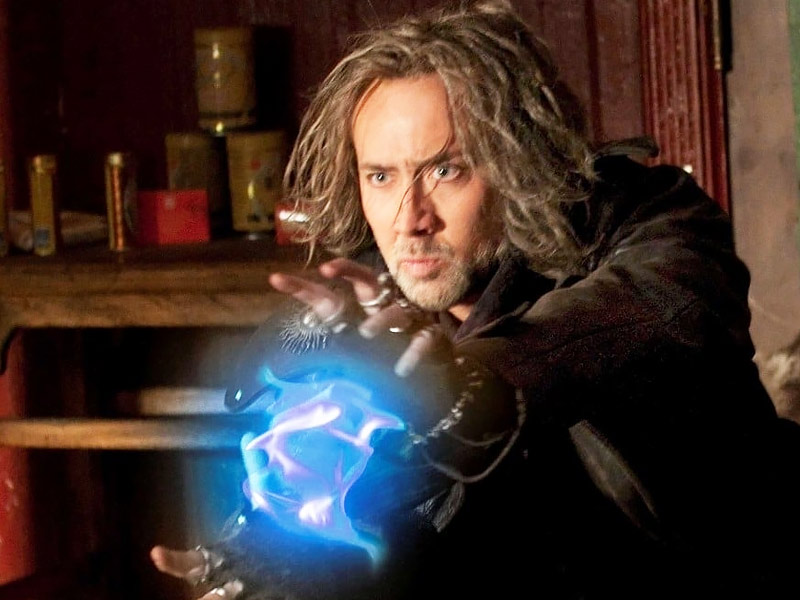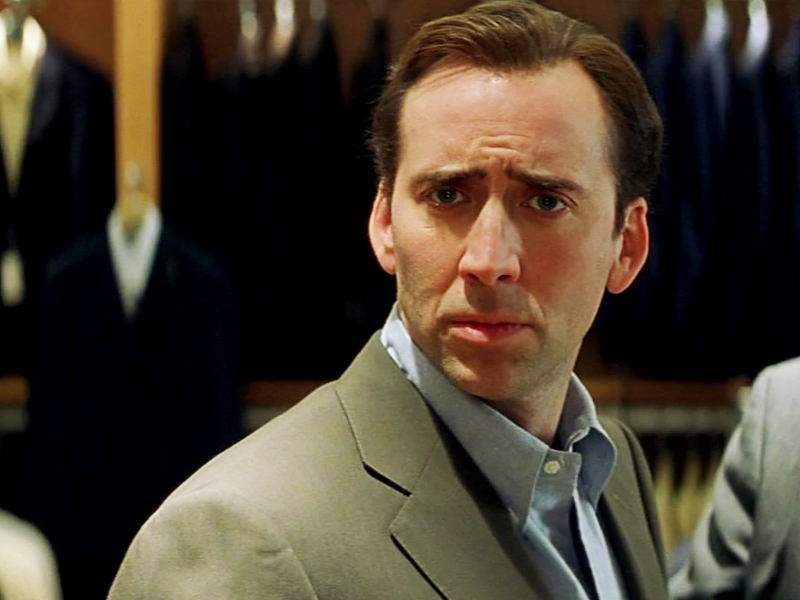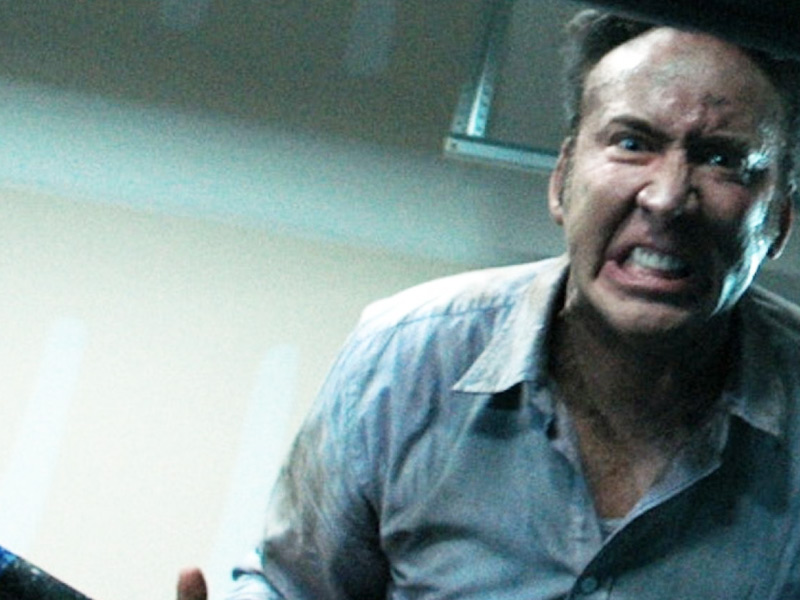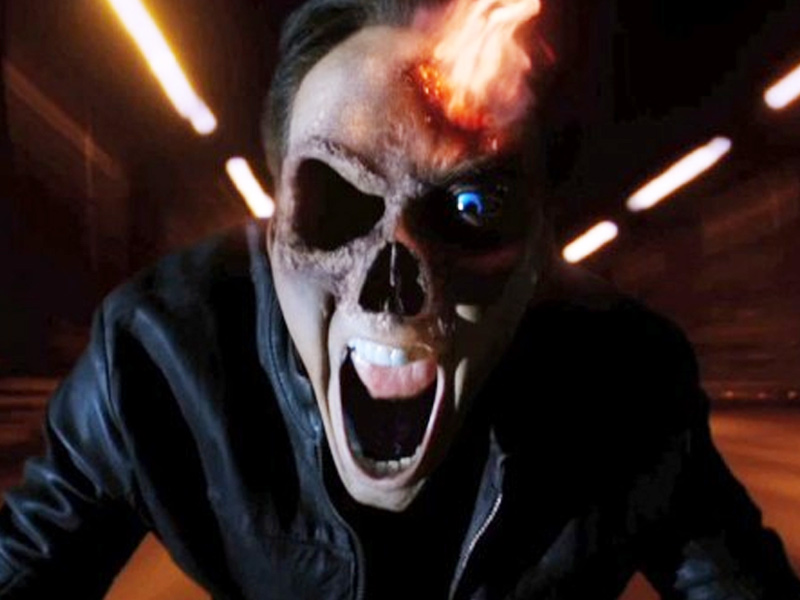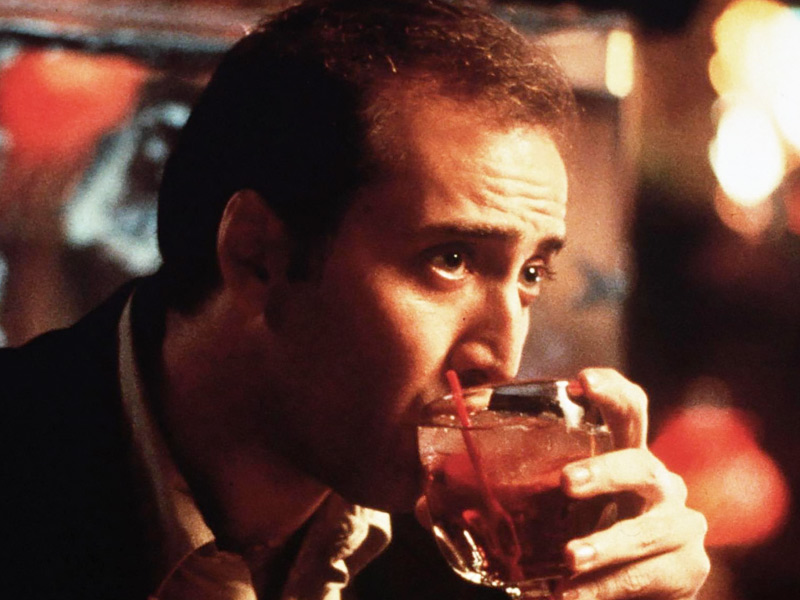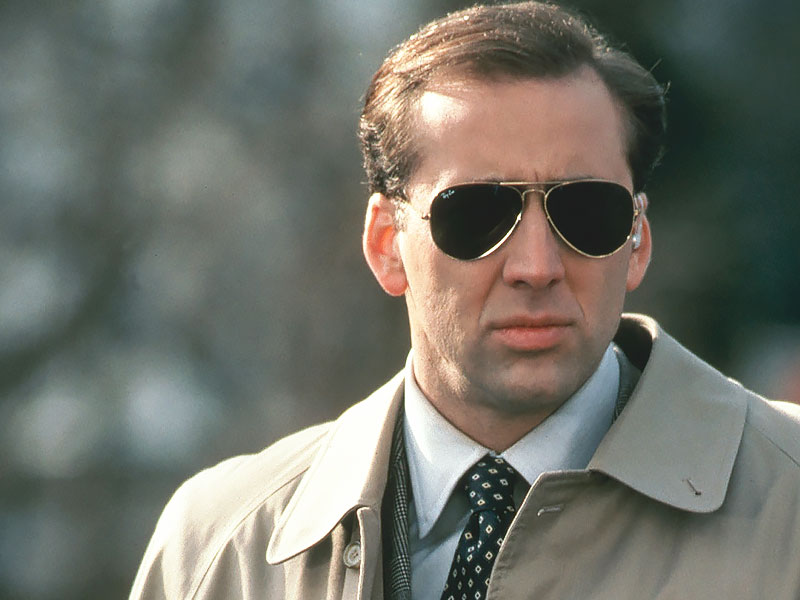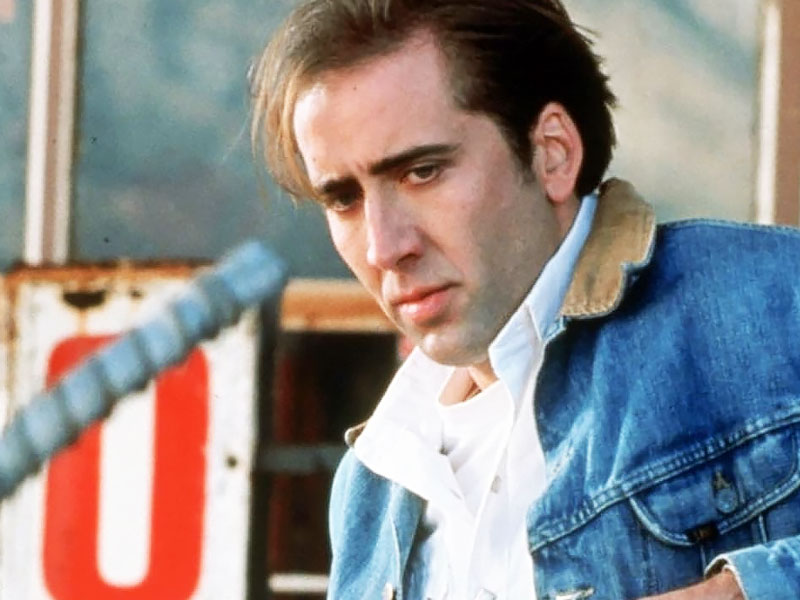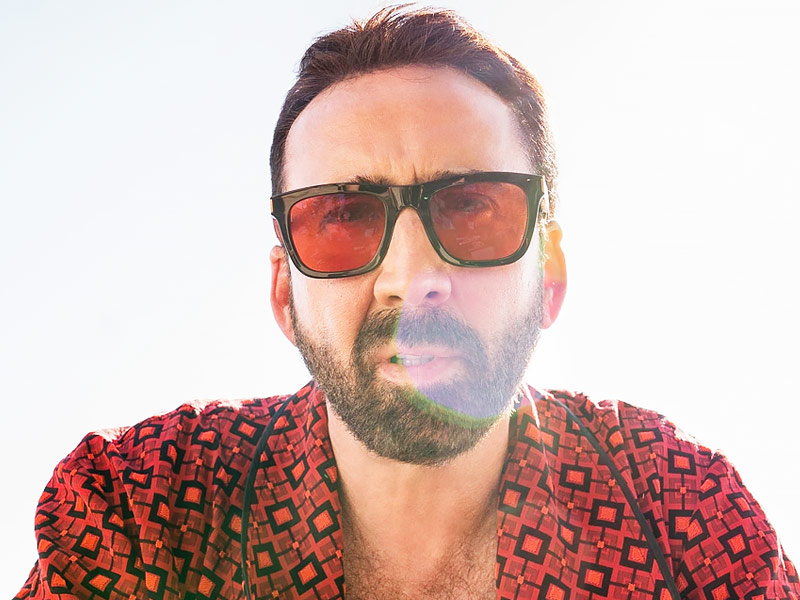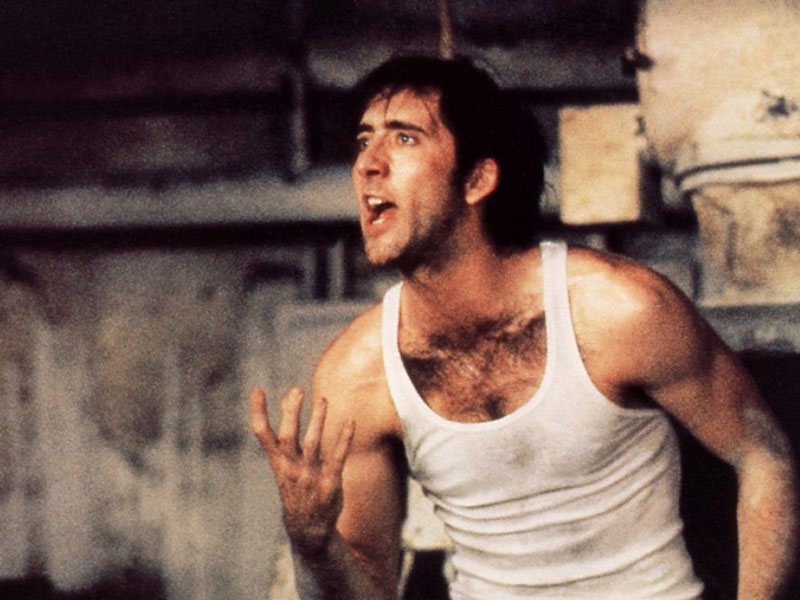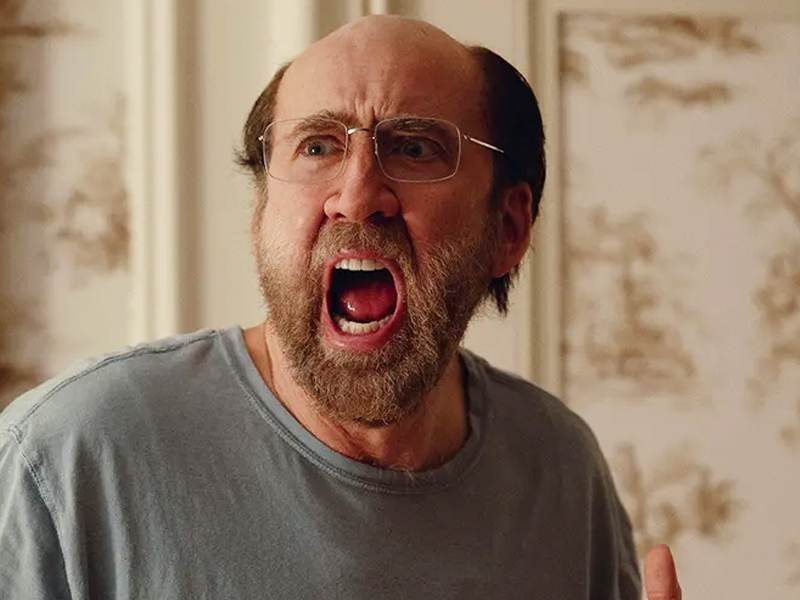Celebrating one of cinema's most original and distinctive actors, the core philosophy underlying The Cage Gauge is that every Nicolas Cage movie is worth watching—because every Nicolas Cage movie has Nicolas Cage in it. Updated upon the release of every new Nic Cage movie (the most recent addition being Dream Scenario), this list uses a unique rating system embracing the actor's beloved qualities. To learn more about The Cage Gauge, visit the about page. This project was created (and all words written by) Luke Buckmaster, who can be followed on Twitter here.
Between Worlds (2018)

Cage's truck driver Joe is a bourbon-gulping everyman who is wild, horny and footloose, in a sad sort of way—with a sluggish demeanor and a defeated gait. When Joe says "a man without a truck isn't a man" this weird line actually feels genuine: a testament to Cage’s performance. Joe becomes romantically entangled with a troubled woman, Julie (Franka Potente), who periodically enters a spirit world, and has an equally troubled daughter, Billie (Penelope Mitchell), who wakes up from a coma, seemingly possessed by the spirit of Joe’s dead ex-wife.
It’s not quite as schlocky as it sounds, director Maria Pulera creating a weirdly interesting atmosphere. Cage does a lot of bonking in this film, the pièce de résistance sex scene arriving 61 minutes in. While having intercourse with Billie, Joe is taken to an alternate world where he’s having sex with his dead ex-wife, while he reads from a book titled “Memories by Nicolas Cage.” You read that right. Other choice Cage moments include not one but two scenes in which he opens a lever-operated musical box, then sheds tears to the tune of Pop Goes the Weasel.
Seeking Justice (2011)

This very well written twist-filled thriller labours the point that Cage’s Will Gerard, a high school English teacher, has everything going for him—being well spoken, middle-class and happily married. This suddenly changes after his wife (January Jones) is assaulted, raped and hospitalised. A mysterious stranger (Guy Pearce) approaches an emotionally devastated Gerard with a weird proposition, advocating a kind of chain letter murder system, whereby bad people are killed by strangers suffering from the actions of other bad people (thereby eliminating motive).
Gerard agrees to take part and the rapist is killed; six months later he's asked to do something to fulfill his end of the deal. Cage is the morally relatable character thrust into a “what would you do?” situation, delivering an excellent, unflashy, outburst-free performance that does a fine job pushing the writing to the fore and letting the script sizzle.
Arsenal (2017)

In this gnarly albeit clumsily constructed crime drama Cage reprises his fiendishly entertaining performance as gangster Eddie King from the 2012 film Deadfall, despite Eddie suffering a painful death involving a deep fryer. No explanation is given for his return…I certainly didn't. I just wanted more of him—with his weird scratchy voice and prosthetic nose; his manic energy; his grossness; his wild cartoon menace.
In an early scene Eddie hoovers up cocaine in a strip club while sharing with ex-con Mikey (Johnathon Schaech) a plan to fleece $350k from Mikey's more successful brother (Adrian Grenier) by staging a fake kidnapping, which doesn’t go to plan. Cage's shit-eating performance chews the scenery, all the way to a finale involving him coughing up blood in a bright orange suit. There’s plenty of random entertainment, for instance when Eddie pauses a tense negotiation scene to comment on how to make a good Bloody Mary: “You gotta have the right of Worcestershire to the right amount of celery.”
Birdy

Cage’s Al Columbato is a young man exuding confidence and bravado: the kind of guy who makes friends easily and gets the girl. Matthew Modine’s “Birdy” on the other hand is the kid mocked for being a “weirdo.” In Alan Parker’s beautifully odd drama we meet Columbato with his face banged up, covered with bandages and looking like the Invisible Man, due to injuries sustained during the Vietnam War. With Birdy in a mental institution, the film jumps back in time to detail the story of their friendship.
The titular character is obsessed with birds, taking Cage to high places in buildings and construction sites, dressing up together in feathers. Cage is the more relatable character, imbuing his performance with warmth and humanity, and the aura of somebody discovering themselves. He finely expresses the frustration of being close to a person who is mentally ill and being unable (or limited in the ability) to help. The performance doesn’t have a lot of range, and doesn’t need it: it’s lovely and tender.
Dying of the Light

Cage's veteran CIA agent Evan Lake is a grouchy bastard, though he has good reason—being mentally and physically scarred by torture, and suffering from frontotemporal dementia. A doctor warns him this debilitating condition can cause “inappropriate reactions” and “mood swings,” laying a narrative justification for some delicious Cageisms. These begin in an explosively entertaining opening speech, Lake yelling at new recruits “what in the name of Jesus Christ nailed to the cross are you doing here?!" Which is an odd way of leading up to his point that “YOU HAVE VALUES!”
The plot is reminiscent of Army of One (which ranks higher on The Cage Gauge), with Cage’s protagonist on a mission to track down a terrorist. He delivers a red hot performance with loads of cantankerous dialogue—including a scene in which he responds to a waiter in a Romania restaurant, who tells him he’s is in the non-smoking section, by shrieking: "Are you out of your fucking mind? This whole country's a smoking section!" The film is quite captivating, though sadly its financiers wrested control of it from director Paul Shrader and released a compromised theatrical cut.
Honeymoon in Vegas (1992)

Director Andrew Bergman’s rom-com has sassy screwball energy; at its best it feels like it could have been written by Preston Sturges. The film opens with the mother of Cage’s two-bit private eye Jack Singer making him promise, on his deathbed, that he will never marry anybody, arguing noone will love him like she does (unsurprisingly, this dude has serious mummy issues). Nevertheless, Singer goes to Vegas to tie the knot with his girlfriend Betsy (Sarah Jessica Parker) but is shocked to discover James Cann’s rich and charming Tommy Korman is determined to steal her from him.
You’ve never seen a detective quite like Singer, depicted by Cage with a boyishly appealing blend of bravado and naivety. You root for him to win around a poker table, but you can sense he won't. Our man delivers a generally contained performance until he suddenly switches gears and explodes—such as a brief but classic scene 52 minutes in. At an airport queue, Cage is driven mad by a dilly-dallying man at the front of the line, screaming “JUST GET YOUR GODDAMN TICKET AND MOVE ON!” It’s more amusing when you see him do it.
The Wicker Man (2006)

We meet Cage’s Edward Malus, a California cop, as he pulls people over and issues them tickets. Soon the stakes are higher: he's searching for a missing girl on an island run by freaky cultists, where he dresses up in a bear suit before getting burned alive. All in a day’s work. Malus is a morally driven albeit smug character who turns his nose up at rural folk, a “barely tolerating you” expression stamped on his face. They recicroprate, elevating a subtext exploring animosity between bumpkins and city slickers.
Malus investigates the island, finding disturbing things and raising his eyebrows a lot. The performance and the film (a remake of the British classic from 1973) settle into a fairly low level of intensity maintained for a long time, until it really scales up in a bonkers final act. Cage, wailing lines such as “HOW DID IT GET BURNED, HOW DID IT GET BURNED?!” takes the part of the frazzled, pushed-to-the-brink cop to unforgettable places. Sadly, the legendary "not the bees!" scene was removed from the theatrical cut.
The Sorcerer’s Apprentice (2020)

The rock star sorcerer! Cage's Balthazar has long hair (like a stringy floor mop) and a fun costume: black trench coat, fingerless gloves, floppy wide-brimmed hat. Early in the film he tells a youngster—Jay Baruchel’s reluctant hero Dave—that he’s going to make a great sorcerer one day. This kicks off a slick performance eschewing the “wise mentor” archetype in favour of a character with a sassy, virile, outrageously cool theatricality. Therefore I have awarded this performance some serious Cage Gauge points for originality.
There’s a lot of crazy crap flying around this movie, the storyline involving Dave defending Manhattan from a wicked wizard (Alfred Molina). Cage periodically does weird CGI-assisted things—for example emerging from an urn and manifesting into human form out of dust, and flying away on a massive steel eagle that comes to life. All the while delivering sensei-like lines such as “clear your mind, believe.” And I do believe in you, Balthazar. The film isn’t great but the character rocks.
The Family Man (2000)

Ah yes: the corporate schmuck would comes to realise the things in life that are truly important—in this instance via a Dickensian time warp. Cage's slick Wall Street executive Jack Campbell is not just loaded and confident—skilled at working the (board) room—but also appears happy and content, which is more than you can say for most of us. But here comes the twist: he wakes up one morning in bed with a girlfriend he left a long time ago, entering an alternate reality in which they're married with two children.
Cage's perfectly aligned performance is exactly what the film needs, balancing that corporate kind of phoniness with the homely qualities Campbell ultimately embraces. There are moments of delicious Cageisms (i.e. an explosive outburst in a department store, Campbell grousing about domestic life) and pockets of drama that are tender and sweet. The running time is at least 30 minutes too long, ambling towards an inevitably sweet conclusion—but you can't fault Cage's performance; it carries the film.
Mom and Dad (2017)

Cage's Brent is a family man living in plain suburbia, where all the houses look the same. Flashbacks to his wild youth—when he drove around recklessly with a topless woman on his lap—communicate that he’s nostalgic about the old days. There’s an element of mid-life crisis in the drama, though this angle of the script is overshadowed by a sludge of midnight movie thrills and spills—with a plotline involving a rapid spread of hysteria that inexplicably causes parents to want to kill their children.
This premise unleashes outré Cage: a cranked-to-11 comic performance so demonic you can't entirely laugh it away. In one scene he erupts into a rant about the youth of today: "the things you've seen on the internet! Mouth to dildo, dildo to ass, ass to ass!" Later, an unforgettable sequence shows the Cageinator destroying a pool table with a sledgehammer while singing/shrieking a bastardized version of the Hokey Pokey (“YOU PUT YOUR RIGHT FOOT IN, YOU PUT YOUR RIGHT FOOT OUT…”). Underscoring his demonic intensity is a melancholic idea about a person realising they have become somebody they don’t like, living a life they never wanted.
Ghost Rider: Spirit of Vengeance (2011)

Old mate Johnny Blaze is rougher and rowdier this time around, with a more tenuous grip on reality than in the first Ghost Rider movie. If Blaze was Jekyll and Hyde in the predecessor, there are scenes here painting him as both and neither—such as one memorable moment on his motorbike, with Cage glitching like a malfunctioning hologram. As the glitching occurs his face contorts into flashes of Ghost Rider, visually evoking a subtext (yeah, this film has one) about the protagonist wrestling with his inner demons.
I got the sense that, second time around, Cage felt emboldened to take Blaze to weirder places, even if the film keeps dragging him back to so-so action scenes and a sludgy voiceover. His narration culminates with the final proclamation that “I’m the Ghost Rider” (no duh). This is a very interesting take on the superhero (or super anti-hero) character as well as an inventive portrait of mental illness—Blaze being possessed by “this thing inside of me.”
Leaving Las Vegas (1995)

“I don’t remember if I sshhaarrtted dwinkin’ becuz my wife left me, or if my wife left me becuz I shhaarrtted dwinkin’,” Cage’s Ben Sanderson blurts out early on, totally maggotted. Films about alcoholics often ask: how low can you go? Albert Finney drank shaving lotion in Under the Volcano; Ray Milland tripped balls in The Lost Weekend. Here Sanderson decides to head to Las Vegas and drink himself to death. However he meets Elisabeth Shue’s Shera, a sex worker, who brings out his better side, the core dynamic involving two broken souls helping each other mend.
Cage won an Oscar for this intense impression of alcoholism, which has a seesawing quality derived from how alcohol affects the protagonist. Booze perks him up; sobriety brings him down. Cage pushes the drama in hard directions, with moments of rage that are thoroughly disquieting—such as a scene in which he overturns a poker table in a casino. Mike Figgis directs with a lighter touch, in a drifty style perhaps inspired by jazz music—which features heavily on the soundtrack.
Guarding Tess (1994)

“I can’t do three more years there. I can’t do three more minutes,” says Cage’s secret service agent Doug Chesnic, kvetching about his mission from hell—to protect Shirley MacLaine’s bitchy former First Lady. Ultra demanding, bored and a fan of mind games, Tess Carlise is the bane of his existence. Cage’s skillfully pitched performance rubs up against her, embodying the widely relatable frustration of hating your job (although I love mine—because I get to write about Nic Cage).
Around Tess, Chesnic speaks through gritted teeth, barely able to control his rage; when she’s not there he yells and grumbles. It’s an original portrayal of a man who seems, initially, a dud of a movie hero: more a babysitter than a Secret Service pro. The chemistry between Cage and MacLaine provides one of the most fun dynamics of Cage’s career, full of deliciously brittle to-and-fro. The film is sharply written, with snap crackle dialogue and—eventually—a finale that puts Chesnic’s bodyguard credentials to the test.
Red Rock West (1993)

Cage has a “not today” look on his face for much of John Dahl’s coily neo-noir about a drifter embroiled in a murder scheme involving a husband (J.T. Walsh) who wants his wife (Lara Flynn Boyle) dead—and vice versa. Said husband mistakes Cage’s Michael Williams for the killer he’s paying to rub out his spouse; Williams pockets half the fee and informs said wife—before the actual hired killer (Dennis Hopper) rocks up. At this point Cage finds himself the straight or straight-ish man opposite the characteristically explosive Dennis Hopper.
There’s lots of dialogue involving hatching plans; a lot of talk about getting paid for this and that. Cage is excellent throughout, with occasional outbursts (such as exclaiming “FUCK MEXICO!” when it’s suggested Williams should hide there) in an impressively conflicted performance. Hopper is the deranged and wickedly wild one, while Cage delivers in spades as the audience surrogate: the person we could be, if we made some very bad decisions.
The Unbearable Weight of Massive Talent (2022)

Cage goes full meta by playing a fictionalised version of himself in this slight and zestily self-aware action-comedy, his latest acting gig turning into a top secret CIA-sanctioned mission to investigate a major crime family. A member of this family, Javi (Pedro Pascal), professes to be his biggest fan, with a room of paraphernalia including a Face/Off wax statue and a freaky sequin cushion. The film draws from a treasure trove of Cage references, celebrating our mighty man with a self-effacing playfulness that undercuts what could have been a cringey vanity project.
Rather than coming across as pretentious or closed off, this meta world feels open and participatory; Cage invites us in. It is, like Ghost Rider, a Jekyll and Hyde story, with Cage as both the angel and the devil on his own shoulders. In some scenes he consults—and in one fabulous moment makes out with—a younger, feistier version of himself, called Nicky, who dares him to be bolder and finds a Cage-tastic catch cry in the exclamation “I’m Nic ffuuuuucckkiiiinnnnnggg Cage!”
Moonstruck (1987)

“I lost my hand! I lost my bride!” cries Cage’s Ronny Cammareri, a one-handed baker with a wooden hand and an attitude as hot as the furnaces he sticks his bread into. Cammareri is a bad boy with—as a Seinfeld episode memorably put it—“the lure of the animal," attracting many women including Cher’s Loretta Castorini, who is engaged to marry his brother. Cammareri’s substitute hand is like the mask worn by the Phantom of the Opera, symbolizing something broken inside a tormented man.
Introduced 24 minutes into the running time, Cage gives the film much-needed energy, raging in the key of melodramatic grotesquery. It is a highly original portrayal of a toxic man—with notes of Marlon Brando and Robert DeNiro circa Raging Bull—that beams in from a heightened reality, giving an otherwise sedate love triangle drama a sense of being subverted. This performative style is the perfect delivery mechanism for dialogue that probably looked overcooked on page—such as “What is life? They say bread is life!"
Colour out of Space (2019)

“We’re living the dream,” Cage’s daggy dad Nathan Gardner tells his wife (Joely Richardson), discussing their decision to relocate from the city to the country. He’s the sort of guy whose idea of a good afternoon is milking alpacas. But his dream is about to be perverted, when a meteorite lands in their backyard and makes Gardner’s family—particularly himself—go mental. This is a “Cage goes crazy” movie: a familiar concept by this point in his career, though he still makes it feel fresh, giving Gardner an unpredictable volatility and some oddly experiential changes in cadence and speech.
Soon the softly-spoken family man is screaming “YOU COCKSUCKER!” and chucking epic tantrums while very sticky, icky, yucky things happen to the people around him. With an atmosphere that swells with disgusting intensity, this is not some garden variety B movie. While the HP Lovecraft-adapted plot provides a justification for Cage getting wackier, the central performance memorably evokes a man whose darkest demons are being teased out. It doesn’t end well for the alpacas.
Deadfall (1993)

This kooky crime movie directed by Cage’s brother, Christopher Coppola, involves a con artist named Joe (Michael Biehn) who believes he accidentally killed his dad, in a con that went wrong, only to learn his dad was involved in a separate con, to con his uncle, who at one point tries to recruit Joe for another one of his cons. That’s a lot of cons. Cage arrives with manic intensity as black sunnies-wearing gangster Eddie, speaking in a bizarre accent and flipped-out tough guy voice, as if in shortness of breath, while snorting coke from his hand.
Cage has a cartoonish death glare and bounces around in full-blown gonzo style: squealing, banging things, putting on insane voices, wrapping his tongue around lines such as “WE FUCK NOW!” Cage’s performance is from a different universe: Looney Tunes meets The Godfather. The Cage Gauge score for “quality” has been boosted a tad due to its sheer fun and freakiness. The film itself is patchy and shallow, saddled with extraneous voice-over commentary, and sadly reducing Cage to a supporting character killed off too soon.
Con Air (1997)

Super buff, wearing a tight white singlet and rocking a hillbilly mullet, Cage speaks with a thick Southern accent in his 90s classic, playing army veteran Cameron Poe—a morally decent dude who loves his wife and isn't shy of a fight. At one point he states his action hero credentials unambiguously, declaring: "I'm gonna save the fuckin' day!" The saving of said fuckin' day involves thwarting the plans of a very dangerous gang—led by John Malkovich—who have hijacked the plane he’s on.
Hot damn our man is in fine form, supported by the Bruckheimer action movie model at its finest. There are big set pieces and loads of spectacle, but also a great pace, snappy writing and a fun amount of audience wink-winking. Cage is front-and-centre in classic moments including a scene in which he makes a now-legendary demand: "I said put the bunny back in the box." This line is so good the writers couldn’t resist making him repeat it later: "Why couldn't you put the bunny back in the box?"Kick-Ass (2010)

You’ve never seen a doting father quite like Cage’s Damon Macready (aka “Big Daddy”) in this wittily irreverent superhero movie about a silly teenager (Aaron Johnson) determined to become a caped crusader. Twelve minutes in, Cage’s first scene has him in tender loving fatherly mode, assuring his little girl (Chloë Grace Moretz) that “you're going to be fine, baby doll”—right before he shoots her. She’s wearing a bulletproof vest, being groomed by Macready (a former cop) to be—like him—a crime-slaying vigilante.
When Big Daddy gets in superhero garb, Cage’s performance becomes a wacked-out parody of Batman, his bizarro Dark Knight and doting dad fusing two highly original portrayals. Big Daddy has an absurd way of disguising his speech when in costume, speaking in intensely stacco rhythms ie: “Finding. You. Was way. Too. Easy.” Director Matthew Vaughn gives his character an unusual origins scene, told in the form of a comic book that appears on screen, accompanied by Cage’s voice-over. His. Performance is. A. Hoot.
Bringing Out the Dead (1999)

Sometimes when a film takes place is as important as the how and why. Martin Scorsese’s Manhattan-set drama is as inseparable from the dark of nighttime as it is Cage’s haunted baggy-eyed face. The film’s second shot is a mega close-up of Cage’s paramedic Frank Pierce, who, burnt out from working the graveyard shift, begins to lose his grip on reality and sees ghosts of people he couldn’t save, including a homeless girl named Rose (Cynthia Roman).
“I was good at my job...but in the last year I started to lose that control,” Pierce ruminates in monotone voice-over, later commenting that his neighbourhood has “more ghosts in square foot than any other.” You won’t be able to shake Cage’s performance: it burrows right in, expressing a pervasive gloominess that ensconces everything in this film—from the sets to the lighting and its slow-moving, deliberately repetitive narrative.
Wild at Heart (1990)

It’s impossible to watch David Lynch’s intensely styled road movie and not think of raised temperatures. Cage’s Sailor Ripley is a hotheaded Southern outlaw who kills a man in the first scene; Laura Dern plays his super sensual lover Lula; and fire is a visual motif. Early on, Lula picks up Sailor from the big house and brings him his much-loved snakeskin jacket, to which he responds: “this here jacket represents the symbol of my individuality and my belief in personal freedom.”
Nineteen minutes in they go dancing, in a bar lit in deep red, where Sailor gets in a fight with a rando then sings Elvis (“Break my faithful heart, tear it all apart…”). This scene—like the film itself—is thrilling, steamy, trippy. Cage’s exhilarating performance is perfectly matched with Dern’s, several memorable scenes following them in a convertible as they fang it down the open road. Their best embrace comes last, in an iconic finale in which Sailor reaches Lula in a traffic jam by running over the top of cars, then sings to her “Love Me Tender.”
Bad Lieutenant: Port of Call New Orleans (2009)

Cage’s Terence McDonagh is an arsehole detective and a total drug fiend, like Harvey Keitel in the 1992 film that inspired this one. He's also thoroughly distinguished despite a Hunter S Thompson style approach to detective duties—i.e. snorting coke in the car before investigating a homicide scene. His addiction encompasses all kinds of drugs: in an early scene Cage gets furious waiting for a prescription in a chemist so he jumps behind the counter to fetch the pills himself, declaring a “police emergency” then gulping them down straight from the bottle.
McDonagh busts drug users and takes their gear for his own use. At one point he verbally attacks an elderly lady, hollering at her “you’re the fuckin reason this country’s going down the drain!” At another (41 minutes in) there's a fabulously trippy scene featuring Cage and a couple of iguanas, one of the lizards seeming to sing. Our man speaks rapidly, as if in fast-forward, delivering a portrayal that’s menacingly sleazy as well as bizarre, unflinching and erratic—like the film itself.
Army of One (2016)

That voice, man, that voice! I've never heard a high-pitched whine like the kind that comes from Cage's motormouth weirdo Gary Faulkner, a delusional flibbertigibbet and “full-time American patriot” who believes he’s on a mission from god to capture Osama bin Laden (and this film was inspired by a true story!). His voice sounds like something from South Park, as if Cage inhaled crazy amounts of helium before speaking. It's an astonishingly funny and original performance in a film that’s bent out of shape, but works as a character portrait of a very strange individual.
The hijinx-filled narrative opens with Cage hang gliding above snow-covered mountains in Afghanistan. When we meet Faulkner properly he's wrapped up in a US flag, surrounded by empty beer cans, soon to pick a fight with army men at a local bar. Director Larry Charles critiques delusional American patriotism that the modern conservative movement has brought to the surface, as well as just having fun with a wacky subject and some strange scenarios.
Joe (2014)

Cage’s titular character is a stern-but-fair boss for a group of men who work for his Texan tree poisoning company. He provides a father-like figure for 15-year-old Gary (Tye Sheridan), whose actual dad is a terrible, violent, drunk, pathetic nogoodnik. But Joe has issues too. Although he initially seems to have it all together, Cage adds fascinating layers to the tough, straight-talking “from down south” alpha male who doesn’t mind getting his hands dirty.
You never doubt the authenticity of the drama, which is rooted in toxic masculinity and has prosaic vibes—until an old enemy of Joe’s (Ronnie Gene Blevins) draws to the surface the protagonist’s demons. At a bar, we watch Cage switch from morose—borderline tearful—to angry and violent: minding his own business one moment and threatening a man with a broken bottle the next. His tremendously controlled performance conveys a flawed and volatile character who nevertheless thinks and feels deeply.
Dream Scenario (2023)

This delightfully strange, funny, sad, happy, tragic, trippy film gives Cage a consistent dramatic arc as well as a smattering of carnivalesque appearances. Sporting a Costanza-esque receding hairline, Cage brings a slightly exasperated, whiny demeanour to biology professor Paul Matthews, who inexplicably begins appearing in the dreams of people he's never met. The film starts to get very funny when Matthews realises he's never doing much in these dreams; he's just...there.
Writer/director Kristoffer Borgli avoids a neat narrative arc and conjures a wonderfully squirrelly and idiosyncratic film. Cage's performance is brilliantly paradoxical, eccentric but in subtle ways—with notes of his portrayal of Charlie Kaufman in Adaptation and Gary Faulkner in Army of One. When things take an awful turn for Matthews, you really feel for this guy; you share his nightmare.
Face/Off (1997)

The premise of John Woo's characteristically operatic action spectacle involves a cop going so deep undercover he has surgery to literally wear the villain’s face. This enables Cage to play both the bad guy—the maniacal Caster Troy—as well as the good guy: FBI agent Sean Archer, who is initially played (pre-switcheroo) by John Travolta. Troy is a wily, crazy-eyed terrorist who wants to watch the world burn. Archer must pretend to be him, meaning Cage must pretend to pretend that Travolta’s character is inside him.
It’s weird, wild, outrageous—and against all odds, it works. Cage’s diabolical cranked-to-11 performance takes on strange nuance, channeling the horror of a man trapped inside another man’s body. After the transformation Troy (no, wait, Archer!) goes mental, destroying a mirror and yelling “FUCK YOU!” repeatedly. Mirrors are a visual motif; later Archer (inside Castor) examines his face in the bathroom while very high—which is weird enough when you’re on drugs, let alone when you’re wearing somebody else’s face. Not that I'm speaking from personal experience.
Matchstick Men (2003)

Ridley Scott’s sharply made black comedy opens with Cage’s conman Roy Waller in a poolside house, counting the number of times he opens the door, then locks the door, then washes his hands. Waller has obsessive-compulsive disorder, in a role that requires from Cage small performances inside the main one. For instance Waller pretends to be the manager of a lottery, a cop investigating fraud and a bank manager for various ruses, working with Sam Rockwell’s fellow scammer. Waller also has a severe case of Tourette's syndrome and is mentoring his estranged daughter (Alison Lohman).
So: there are several layers to Cage’s excellent performances as a shyster who is likeable despite his flagrantly immoral behaviour. Early on we see him go funny when he doesn’t take his pills and anticipate this happening again, adding nervous intensity to an already highly strung character. In one vintage scene at a chemist, Cage asks a customer “have you ever been dragged to the sidewalk and beaten until you PPISSEDD BLOOODD?”
The Rock (1996)

The most ingenious thing about Cage’s performance as Dr. Stanley Goodspeed is his irresistible blend of uber nerd and action hero. “I’m a chemical super freak actually, but I still need a gun!” he squeals, out of his element, brought to the titular former prison on Alcatraz Island, which has been seized by terrorists holding San Franciso ransom with missiles full of hideous gas. Teamed with the tough and crotchety Sean Connery, playing the only man who ever escaped the jail, Cage gets deliciously shouty as the narrative progresses, memorably ending one sentence with “so why don’t you cut me some FRIGGIN’ SLACK!”
When they arrive on the island this thrillingly paced production—a stand-out of 90s action movies—follows a video game format: find missiles, diffuse them, take down baddies, repeat the cycle. Cage is the ultimate brains-over-brawn hero, of whom even MacGyver would envy. Is there a subset of chemistry enthusiasts out there who worship on the altar of Goodspeed? There should be.
Adaptation (2002)

Woody Allen style neurosis feels tame compared to Charlie Kaufman style neurosis, as Cage demonstrates—playing an extra frazzled version of the screenwriter in Spike Jonze’s innovatively quirky comedy-drama. Cage’s exasperated impression of Kaufman begins with a stream of consciousness rant: “Do I have an original thought in my head? My bald head. Maybe if I were happier my hair wouldn’t be falling out…”. Soon he's sitting at a restaurant, dripping sweat, his internal monologue yabbering on as he discusses adapting a book with his agent.
It’s a great role, but it doesn’t end there—because we get a second Cage performance. He also plays Charlie’s chatty Kramer-like identical twin Donald, who is confident and relaxed in ways Charlie is not. Cage shares great chemistry with himself (ridiculous though this may sound), showcasing fabulous range via chalk and cheese personalities. This audacious film—a highly original depiction of writer’s block—includes moments in which the protagonist writes scenes we have already watched.
The Weather Man (2005)

“That was refreshing. I am refreshing,” Cage’s David Spritz says to himself in the mirror in the opening scene. His smile transforms into a more serious look, which—like this shrewdly calibrated oddball character study—is difficult to read. Contemplating a massive raise and a move to NYC for a more prominent gig, Spritz is a thoroughly slappable celebrity weatherman: smug and intemperate. Yet Cage makes him pitiable—despite him being a highly privileged man working two hours a day for $230k a year.
Speaking in slow, flat, almost stoner-like drawl, Spritz has a pathetic boyishness that occasionally leads to very funny outbursts. In one scene for instance he slaps his ex-wife’s new partner in the face with a glove; in another—apropos of nothing—he yells at the same guy: “you are a dildo, pork fucker porker!” Playing a sad sack who everybody seems to be attracted to, in some way, but nobody seems to really like, Cage’s insidiously charming performance quietly works its way into you. The strangeness of this film is—as Spritz might say—refreshing.
Mandy (2018)

Cage’s Red Miller is a logger who embarks on a murderous rampage to avenge the death of his girlfriend, after she's burned alive in front of him by a cult of vile freaks. Miller is introduced as the protagonist but for a long time Cage is absent, before finally returning with a vengeance—like an unleashed beast. Soon he’s howling like a primordial beast in a bathroom while covered in blood, necking spirits straight from a bottle. And later—another excellent Cage moment—engaged in a chainsaw duel to the death. Because of course he is.
It's a bold and morosely agonized performance, with mythical connotations: the lone warrior forging his weapons and rising up to rebel against evil. Director Panos Cosmatos creates an intoxicating visual style that weeps colour and light, as if bathed in the ooze of a punctured lava lamp. Never has the atmosphere of a Cage film been richer, gluggier, more intensely hallucinogenic. Actor and aesthetic combine to make a strikingly original (and very squeamish) experience.
Raising Arizona (1987)

Often classic films build towards iconic shots, but this marvelously unorthodox Coen brothers rom-com begins with one: a police line-up of Cage in a Hawaiian shirt and white singlet, our man looking very spunky with stylishly parted hair and mutton chops. The narration from his small-time crim kicks in immediately (“my name is H.I. McDunnough—call me Hi”), setting in motion a sprightly caper about two lovers (Cage and Holly Hunter) who can’t have children of their own, so they steal one of a quintuplet of sons born into the family of a furniture magnate.
Speaking in Southern drawl and playing a boneheaded man with an impish twinkle in his eye, who always runs afoul of the law, Cage’s comic timing is superb. There’s a disconnect between McDunnough’s learned loquaciousness and lower-class upbringing, but who cares? This is a joyously funny and sly performance in a film peppered with funny moments, including an elongated action scene in which Cage takes down a cop by throwing at him a large packet of Huggies nappies.
Pig (2021)

Cage’s Robin Feld was once a fancy chef but is now a hobo-looking truffle forager, living off the beaten track. Beginning in picturesque nowhere, our craggy-faced star wanders through the woods with his beloved: a pig that’s soon stolen (pignapped?) for unclear reasons. The initial moroseness on Cage’s face is nothing compared to when he goes searching for said hog, his character forced to return to the world, the city, he abandoned, striking me as somebody who looks like he came all the way from Middle Earth. When he speaks he sounds reluctant and muffled, as if a sock were stuffed in his mouth.
Both Cage’s brilliantly somber performance and this moody, moving film hit a high water mark during a thematic centerpiece scene in a fancy restaurant. A bloodied Feld, looking very out of place, calls for the chef then serves him a piercing Baudrillardian rant. “None of it is real,” he grumbles. “The critics aren’t real. The customers aren’t real. You aren’t real.” Never before have you seen a foodie who talks, moves, thinks like this. Cage is mystically, magically, sublimely good.
Vampire's Kiss (1989)

It is a theatre of the damned; a trip to the extremities of consciousness. It is the laboratory in which the most original actor of his generation first started seriously experimenting. Cage’s Peter Loew is a vampire—and literary agent—unlike any other, his descent into madness hastened when he's bitten by a woman he meets at a nightclub. This triggers an elongated transformation in which Leow becomes, among other things, cinema’s creepiest workplace bully, targeting the lovely secretary Alva (María Conchita Alonso).
Loew is one hell of a client for his psychologist (Elizabeth Ashley), exploding into monologues such as a legendary rant about filing documents: “You just put it in the right file according to alphabetical order!” he exclaims, before dramatically pronouncing the whole frickin alphabet, letter by letter. Cage’s face is so manic, so bulging with weird pent-up energy, it’s clear he beamed in from another dimension—from the world of German Expressionist horror movies, perhaps. The shagginess of the script and Robert Bierman’s direction works in the film’s favour, giving our favourite actor the space he needs to pick up its darkly comic vibes and run with it—all the way to hell and back.

